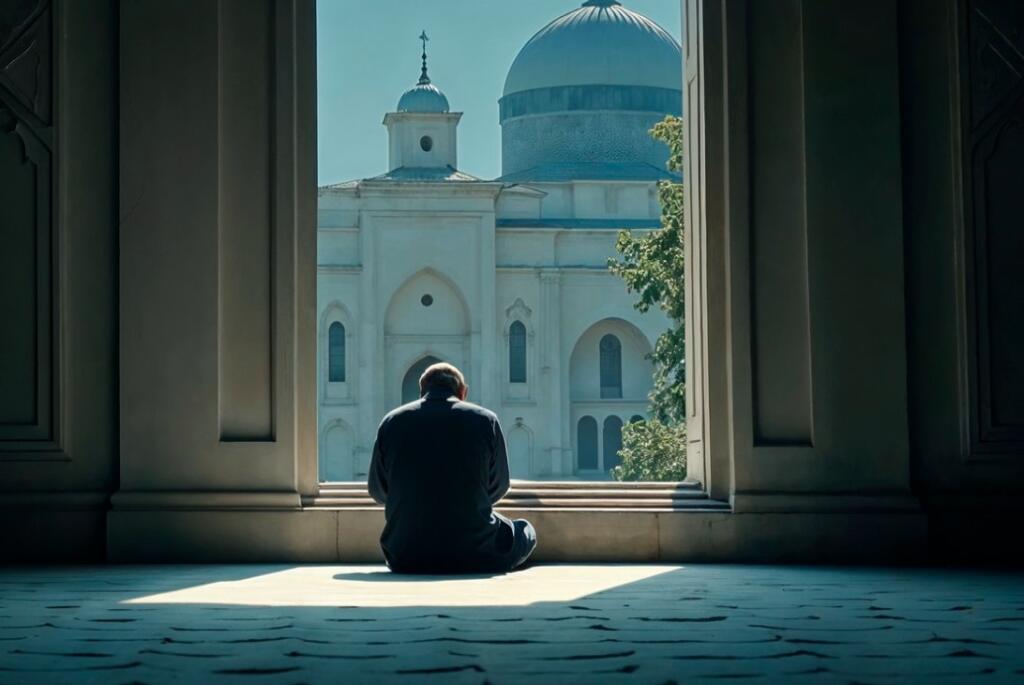Subtotal: £4.00
The following are outward etiquettes that greatly increase the likelihood of our supplications being accepted:
1. Prepare Yourself: Wudu & Facing the Qiblah
Abū Mūsā (raḍiyallāhu ʿanhu) reported that when Abū ʿĀmir was killed in battle, the Prophet ﷺ performed wuḍū’, raised his hands, prayed for his forgiveness and then said: ‘O Allah, make him on the Day of Judgement above many of Your creation’” (Bukhārī).
Similarly ʿUmar b. al-Khaṭṭāb (raḍiyallāhu ʿanhu) said: “On the Day of Badr, the Messenger of Allah ﷺ looked at the disbelievers, and they were one thousand, while his companions were only 319 men. He then turned to face the qiblah, raised his hands, and began calling upon his Lord, saying: ‘O Allah, fulfill what You have promised me! O Allah, give me what You promised me! O Allah, if this small band of Muslims is destroyed, You will not be worshipped on earth!’ He continued to call upon his Lord, raising his hands and facing the qiblah, until his cloak fell from his shoulders…” (Muslim).
Imām al-Nawawī (raḥimahullāh) writes, “This ḥadīth shows the recommendation of facing the qiblah and raising the hands when making duʿā’.”
2. Raise Your Hands
The Messenger of Allah ﷺ said, “Indeed, your Lord is Generous and Shy. If His servant raises his hands to Him, He becomes shy to return them empty” (Tirmidhī). In another narration, he ﷺ said, “Indeed, Allah is Merciful, Modest, and Generous. He feels shy that His servant should raise his hands to Him, and He does not place any good in them” (Ḥākim).
SubḥānAllah! The Lord of all creation feels shy to turn away a servant who turns to Him with raised hands and a needy heart. How immense is His mercy, and how perfect is His generosity! This ḥadīth fills the heart with awe and love for Allah, so Generous and Kind that He never lets a sincere duʿā’ go unheard.
3. Begin With Praise and Salawat
The Messenger of Allah ﷺ once heard a person making duʿā’ during prayer. He did not glorify Allah (ʿazza wa jall) nor invoke ṣalawāt upon the Messenger of Allah ﷺ. The Messenger of Allah ﷺ said, “He was too hasty.” He called him and said, “When one of you makes duʿā’, he should start off with praising and glorifying His Lord (ʿazza wa jall), and should then invoke ṣalawāt on the Prophet. He should then make duʿā’ for whatever he wishes” (Abū Dāwūd).
Ibn al-Qayyim (raḥīmahullāh) writes, “Asking Allah to send blessings upon His Messenger ﷺ is one of the greatest and most beneficial supplications a servant can make, both for his worldly life and for his hereafter.”
The Messenger of Allah ﷺ said: “Every duʿā’ is veiled (not accepted) until ṣalawāt are sent upon the Prophet ﷺ” (Bayhaqī).
Abū Sulaymān al-Dārānī raḥimahullāh said, “Whoever wants to ask Allah for his needs, let him start by sending ṣalawāt upon the Prophet ﷺ then ask for what he needs, and then end his duʿā’ with ṣalawāt (again) upon the Prophet ﷺ. For sending ṣalawāt upon the Prophet ﷺ will be accepted, and Allah is too generous to refuse (the duʿā’ made) between the two ṣalawāt.’
“Duʿā’ is suspended between the heaven and the earth and none of it ascends until you send ṣalawāt upon your Prophet ﷺ.” – ʿUmar b. al-Khattāb (raḍiy Allāhu ʿanhu)
4. Call Upon Allah Using His Names
Allah commands us to call upon Him by His Names, “To Allah belongs the Most Beautiful Names, so call on Him by them” (7:180).
One of the most beautiful and effective etiquettes is to call upon Allah using the Names that best match the need or request. Each of His Names carries specific meanings, and invoking the one most relevant to your situation reflects both understanding and sincerity.
When you call upon Allah by His Names, remove the definite article “al-.” For example, say “Yā Razzāq” rather than “Yā al-Razzāq.”
5. Call on Allah Through Your Good Deeds
One of the etiquettes and means of having your duʿā’ answered is to precede it by mentioning a sincere deed done solely for the sake of Allah. This is known as tawassul through righteous actions.
The Prophet ﷺ once narrated a story of three men who had taken refuge from the rain in a mountainside cave. Upon entering, a big rock fell from the mountainside blocking their exit. They each took turns calling upon Allah using their best deeds: one spoke of his dutiful service to his parents, another of his refusal to commit immorality despite the opportunity, and the third of his honesty in returning the full wages of a labourer. With each duʿā’, the rock shifted slightly until finally they were able to leave the cave safely (Bukhārī).
Tawassul is not boasting of one’s deeds, but rather a form of sincere submission and acknowledgment of one’s reliance on Allah.
6. Supplicate With the Duʿas From the Qur’an & Sunnah
ʿĀʾishah (raḍiy Allāhu ʿanhā) said, “The Prophet ﷺ used to prefer concise, comprehensive duʿās and would leave aside anything else” (Abū Dāwūd).
Although it is permissible to supplicate in your own words according to your personal needs, the duʿās from the Qur’ān and Sunnah are unmatched in their style, prose, and completeness. They are brief in wording yet vast in meaning, encompassing every possible good in both this world and the next, and seeking refuge from every kind of evil.
The precision of wording and the depth of meaning found in the sunnah duʿās are unmatched. The Prophet ﷺ reached the pinnacle of perfection in his servitude of Allah. His knowledge, love, humility and reverence of his Creator was unparalleled. His supplications and remembrances are a reflection of this, and form the most perfect formulae for duʿā’.
7. Begin With Istighfar
The Messenger of Allah ﷺ said, “Allah, Exalted is He, said: ‘Son of Ādam, as long as you call upon me and hope in Me, I will forgive you irrespective of what you do, and I do not care. Son of Ādam, even if your sins were to reach to the clouds of the sky, then you seek forgiveness from Me, I will forgive you. Son of Ādam, even if you were to come to Me with nearly an earth full of sins, and then you meet me, not having associated anything with me, then I will surely bring you as much as the earth in forgiveness’” (Tirmidhī).
From this ḥādīth, Ibn Rajab (raḥimahullāh) outlined three means of attaining forgiveness:
- Calling upon Allah with hope, knowing that only He forgives.
- Asking Allah for forgiveness, despite the magnitude of one’s sins.
- Actualising tawḥīd (the oneness of Allah). This is the greatest means of forgiveness. If even a speck of tawḥīd was placed on a mountain of sins, it would turn them into good deeds.
An excellent duʿā’ which combines all of the above is sayyid al-istighfār (the most superior supplication for seeking forgiveness). When seeking forgiveness, try to feel remorse in your heart, cry over your sins and beg Allah to forgive you.
“Asking for Allah’s forgiveness is more important than all other duʿās.” – Ibn Taymiyyah (raḥimahullāh)
8. Ask for the Ultimate Good: the Hereafter
The Prophet ﷺ once said to a man, “How do you supplicate in your prayer?” The man replied, “I recite the tashahhud and then I say: ‘O Allah, I ask You for Paradise and I seek Your protection from the Fire. But, by Allah, I am not good at your murmuring nor the murmuring of Muʿādh.’” So the Prophet ﷺ said: “It is around them that we murmur” (Abū Dāwūd).
The Prophet ﷺ kindly reassured him that all duʿās ultimately revolve around these same core goals: attaining Jannah and being saved from the Fire. While it is important to ask Allah for your worldly needs, your primary focus should always be the hereafter. Do not be among those who ask only for this world and neglect the next.
Al-Ḥāfiẓ ʿAbd al-Ghanī al-Maqdisī (raḥimahullāh) said, “The greatest things a servant can ask his Lord for are three: (1) the pleasure of Allah, the Mighty and Majestic; (2) to see His Noble Face; and (3) al-Firdaws al-Aʿlā (the highest level of Paradise).”
Ibn Taymiyyah (raḥimahullāh) said: “I contemplated the most beneficial supplication, and it is this: asking Allah for help to attain His pleasure.”
9. Begin With Yourself in Duʿa
Whenever the Prophet ﷺ mentioned one of the Prophets, he would begin with himself, saying: ‘May Allah’s mercy be upon us and upon my brother’ (Abū Dawud).
Imam al-Suyūṭī (raḥimahullāh) said, “For this reason, scholars recommended that a person begin their duʿā’ by praying for themselves before others, as it is more likely to be answered. This is because it reflects greater sincerity in desperation, deeper servitude, stronger expression of need, and greater distance from arrogance and self-admiration. This was the practice of the Prophets and Messengers.”
Imam al-Nawawī (raḥimahullāh) said, “It is recommended for a person to begin with himself in duʿā’, as well as with matters related to the Hereafter. As for worldly benefits, the proper etiquette is to show preference to others and put them before oneself.”
10. Pray for the Ummah
Allah says, “Seek forgiveness for your sins and for the believing men and women” (47:19).
The Prophet ﷺ said, “Whoever seeks forgiveness for every male and female believer, Allah will record a good deed for him for every male and female believer” (Ṭabarānī).
We should make duʿā’ for the entire Muslim ummah, asking Allah for their guidance, forgiveness, and relief; and supplicate against the enemies of Islam, including tyrants who oppress and torture believers. At times, the suffering of the ummah can feel overwhelming, and the cruelty we witness may leave us feeling helpless. Yet a believer is never powerless. Our greatest weapon is duʿā’. Never underestimate its strength.
We should also consistently supplicate for our parents, family members, teachers, companions, friends, and our loved ones. It is also important to pray for those we may have wronged, as well as for everyone who has shown us kindness or benefited us in any way. The Prophet ﷺ said, “Whoever does you a favor, then repay them. If you do not find anything to repay them with, then make duʿā’ for them until you are sure that you have repaid them” (Abū Dāwūd). Imām Aḥmad (raḥimahullāh) said to the son of Imām al-Shāfiʿī (raḥimahullāh), “Your father is among the six people I pray for every night before fajr.”
Such sincere remembrance in duʿā’ is a beautiful expression of gratitude, love, and loyalty.
Tip: When you make duʿā’, include in your intention that the good you ask from Allah is also granted to all the believers. By doing this, you earn the reward for praying for yourself and the reward for praying for others. This act of selflessness not only multiplies your blessings, but also increases the chances that your own duʿā’ will be accepted. The Prophet ﷺ said: “No Muslim servant prays for his brother in his absence except that the angel says: ‘And for you the same’” (Muslim).
Note: The method described above is meant to help you perfect your duʿā’ as much as possible. However, this does not mean that you cannot make duʿā’ without following all these steps. Sometimes, you may only be able to say a single duʿā’, or find yourself in a situation where a longer supplication isn’t possible; and that is perfectly fine.
The Optimal Guide for Making Duʿa
- Make your heart present and completely focus on Allah.
- Choose a time in which duʿā’ is readily accepted.
- Perform wudu, face the qiblah and raise your hands.
- Humble yourself and submit to Allah.
- Start by praising Allah.
- Send ṣalawāt upon the Prophet ﷺ.
- Repent for your sins and ask for forgiveness.
- Ask with persistence, love and fear.
- Ask Allah through His Oneness and Names.
- Give ṣadaqah before making duʿā’.
(Adapted from al-Jawāb al-Kāfī by Ibn al-Qayyim (raḥimahullāh)

 My Dhikr Companion - Hardback
My Dhikr Companion - Hardback 

